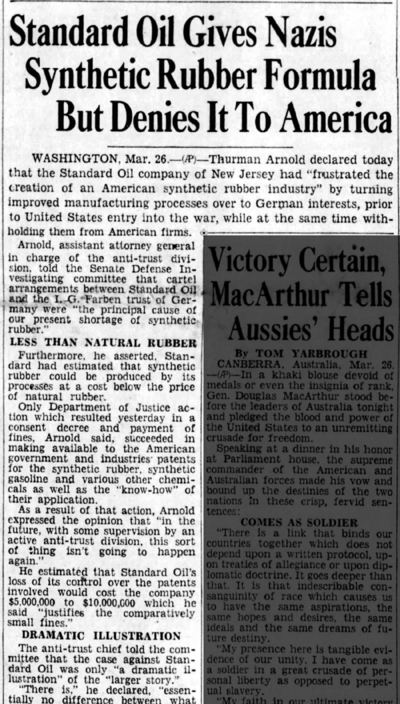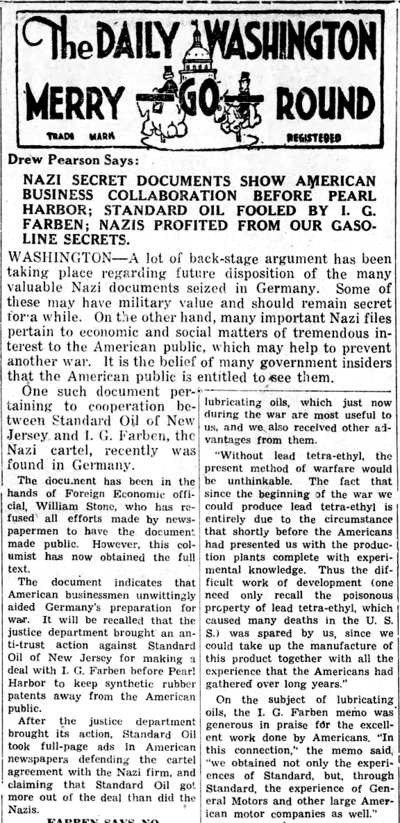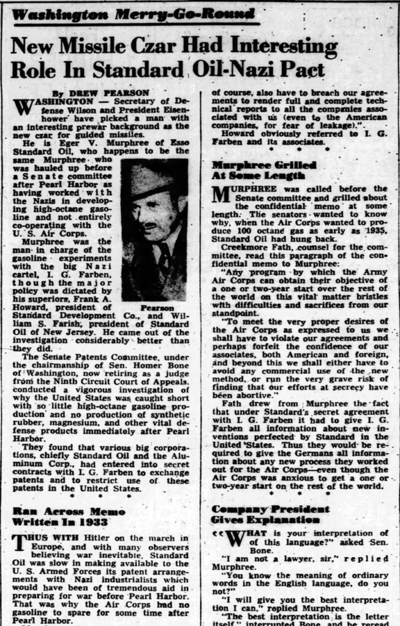Open Letter to Energy Analyst Michael Lynch - UPDATED with REBUTTAL to Marc Rauch
 |
By Marc J. Rauch
Exec. Vice President/Co-Publisher
THE AUTO CHANNEL
 Marc J. Rauch |
I just finished reading an article you wrote for the Forbes Magazine website titled, "Put Ethanol In People, Not Gasoline." I know it's been five months since you published the story, and I apologize for not writing to you sooner about this article.
The problem is that between spending time with my two beautiful dogs and working to correct all the other wacko anti-ethanol articles that appear online and in print, I sometimes get a bit backlogged. The great thing is that the Internet keeps everything handy to pullout out and use, like a huge big refrigerator. Unfortunately, this Internet "refrigerator" is like a real refrigerator in that if you put in some rancid meat or spoiled milk it doesn't magically turn fresh, it just stays rotten. This brings me to your Forbes article...
 Michael Lynch (pic from Forbes.com) |
WOW! Wowee, wow, wow, wow! (In my minds eye I can see and hear actor Christopher Walken say this line. If you can't image it, here's the video clip:)
Michael, you definitely have great credentials and experiences. The only thing is that none of this background makes you qualified to comment on ethanol as a viable fuel, let alone to own and operate a lawn mower that has sharp cutting edges on it.
You write an article that incorrectly lambastes the economics and business aspects of ethanol, and then close it out with a misdiagnosis of what went wrong with your lawn mower. I'll start here, because hopefully the explanation of the problem you experienced with your lawn mower will help to simplify why you don't understand the economic and business problems related to ethanol fuel.
The inefficient burning of gasoline causes the build-up of debris in an internal combustion engine. This problem has existed in internal combustion engines since the advent of using gasoline to run internal combustion engines, and it happens with all sizes of gasoline-powered internal combustion engines. It is a problem that the greatest scientific and technical minds have been challenged by for almost 150 years. Now that deserves a real, sincere WOW!
The answer to alleviating the problem of this gasoline debris buildup is to add some type of detergent to the gasoline. You know, something like a solvent to help dissolve and loosen the debris from clogging up the works. Now let's say you had a gasoline-powered lawn mower in the 1950's or 60's, and after a couple of seasons' use you find that it's not operating smoothly, or at all. You'd open up the engine compartment and you'd notice all this crude/goop/slime covering all the parts and components. You'd see nozzles and crevices clogged up. If you're a do-it yourselfer, you'd begin to clean the parts and components. Along with some rags and a brush, you'd use a solvent...something lying around the house, like rubbing alcohol, or a brand name automotive care product that contains some type of alcohol. Now, it wouldn't really matter what type of alcohol was in the solvent, but it could easily have been ethanol.
The petroleum oil and gasoline industry know about this debris problem, which is why they added detergent to gasoline (this was the reason for detergent, not because they were suggesting that you could do your laundry in the car's engine compartment). But even with adding detergent, the gasoline debris build-up process is so severe that the build-up still occurs, and it can require professional maintenance.
There is a solution to eliminate or keep the gasoline debris problem to a minimum, and this solution is the same solution recommended by the world's largest manufacturer of marine engines: Mercury Marine. Now, I specifically bring up Mercury Marine for two reasons: First, boat engines are often classified as smaller engines (which you target), and because marine engines often have open-vent fuel systems (which some people wrongly believe makes them more susceptible to ethanol's 'ability' to suck water right out of the air).
The solution suggested by Mercury Marine is the use of an ethanol-gasoline blend!
In the ethanol webinar conducted by Mercury nearly ten years ago, Mercury stated that the ethanol-gasoline blend will help keep your engine free from debris build-up. Now, I admit that Mercury says that the engine might first have to be thoroughly cleaned, but the need for the cleaning is as a result of the inefficient gasoline burning, not ethanol's efficient burning (ethanol does not cause inefficient burning).
Mercury also states (correctly, I might add) that ethanol has no ability to suck water out of the air!
Presuming that you were successful in cleaning your lawn mower engine and getting it running again, the best thing you could do for it is to make sure that you use an ethanol-gasoline blend as fuel. And my personal suggestion is that you should use at least E15 or E20 instead of just E10.
Now, if this little tutorial wasn't enough for you to understand why you have mis-analyzed the ethanol fuel market, I'll explain further. The engine fuel market is not an open and free market. It has
virtually never been an open and free market. It has always been controlled by the government, corporations, or both. The public has never had the free choice in choosing which fuel to use because government actions
or corporate actions, or both simultaneously, have kept the public from being able to make a fair price comparison between a petroleum oil fuel and a non-petroleum oil based fuel, such as ethanol. If you're an
historically-deprived person, and you don't understand how and why the public never had a free choice in determining which engine fuel to use then you might like to read the thesis that Robert L. Bradley, Jr.
asked me to write for him:
"Life As We Might Have Known It: What If Ethanol Was Our Primary Engine Fuel".
If you didn't know this historical information; tsk, tsk, tsk. If you knew it but you were hoping that no one else would know it, I'm sorry to burst your bubble. And if you think you know some factual information that is contrary to what I wrote about in my thesis for Rob Bradley, hahahahahahaha, you don't.
More to the point, Michael, regardless of whether you know the history or not, in your Forbes article you try to ridicule people from two different ethanol organizations over their comments about "market share"
and "consumer choice." You accuse them of using "Orwellian Doublethink." But they're not the ones deserving ridicule, you are. And regarding the "doublethink" comment, if anyone is guilty of
doublethink it's the oil industry and their peons who have amped up sycophantic oil industry hyperbole to full-blown Josef Goebbels' style hypocrisy. If this analogy is over your head, you can read my paper:
"The Hypocrisy of Big Oil and API"
By the way, the reason I particularly link oil industry doublethink to Josef Goebbels is because of the massive support given to the Nazis by the oil industry's biggest entities, such Standard Oil and Royal Dutch Shell. Supporting the petroleum oil industry over domestic ethanol is un-patriotic. Oil companies in America have little or no allegiance to America. People who work to support the oil companies are either dupes or they too have no allegiance to America. Frankly, I don't care who or what you have allegiance to, but I'll be damned if I stand by and let you pretend that you care about America and its citizens while prattling on in support of an industry that is responsible for killing untold millions of humans and other animals - and I'd say the same thing to any oil industry bootlicker in whatever country they claim citizenship and residence.
You go off on criticizing the energy required to produce ethanol without pointing out that ethanol is energy positive whereas gasoline production is energy negative. In any event you take the entire EROEI issue out of context because you don't acknowledge that ALL usable energy requires tremendous amounts of energy to produce it. And you act as if petroleum oil fuels are not huge causes of harmful emissions (some say, the worst causes). Is this how you analyze energy issues for clients?
You conclude that you think it's time for a "million mower march." Well I think it's time for a "300 million 'merican march" to get rid of petroleum oil fuels.
I hope you'll respond to this open letter, Michael. And to make it easy for you to want to, I included a little something about the Mercury Marine situation that you can try using against me. I hope you'll try, let's see it you can find it.
Cheers.
May 10, 2019:
On the day that we published the above Open Letter to Michael Lynch, March 14, 2019, I sent an email to him advising him of the Open Letter and provided a link where he could read it. Mr. Lynch never replied to me. I did,
however, receive a return-receipt, indicating that he received my email. Five weeks later, on April 23rd, he published a rebuttal
to my Open Letter on the MasterResource.org energy blog. I was never notified of this posting, but I did learn of it yesterday, on May 9th. The following is the full text of Michael Lynch's rebuttal, and then my response
to the rebuttal (if and when other follow-up replies are made by Michael or myself, I will then do a new update to this post).
Ethanol as an Alternative to Gasoline: Response to Rauch
By Michael Lynch -- April 23, 2019
“So, apparently all the mechanics I’ve talked to and all the people selling correctives to the ethanol in gasoline are completely off-base, presumably in the pockets of the oil industry. Yet even magazines like Popular Mechanics have weighed in with warnings.”
Back in October, I posted a piece on Forbes.com, “Put Ethanol in People, not Gasoline,” which was prompted by my ongoing struggles to keep my lawnmower functional. In response, Marc Rauch, executive vice president/co-publisher of the Auto Channel, took exception to my arguments that gasoline with 10% ethanol damages small engines and, more generally, that ethanol does not improve energy security by providing surge capacity to replace lost energy supply.
I respond to Mr. Rauch’s "Open Letter to Energy Analyst Michael Lynch" below.
Let’s start with his argument that my lawnmower problems were because of gasoline–and solvable by an ethanol-gasoline blend.
“The inefficient burning of gasoline causes the build-up of debris in an internal combustion engine,” Rauch states. People who used lawnmowers in the 1950s and 1960s find that it’s not operating smoothly, or at all. You’d open up the engine compartment and you’d notice all this crude/goop/slime covering all the parts and components….
That’s funny. I mowed lawns for money in the 1960s, sometimes 12–15 times a week, and never had such a problem.
True, gasoline engines can get dirty enough where, as Popular Mechanicsnotes, “Alcohol will also scour varnish and deposits out of the fuel system that have remained in place for years.”
But avoiding ethanol for such a role is akin to leaving the rust that holds the car together. It’s hardly a plus for ethanol that using it a few times has to be followed by a visit to the mechanic—and then it’s better!
Mr. Rauch’s support apparently comes from this ten-year-old webinar by Mercury Marine, a major engine manufacturer.
The solution suggested by Mercury Marine is the use of an ethanol-gasoline blend! In the ethanol webinar conducted by Mercury nearly ten years ago, Mercury stated that the ethanol-gasoline blend will help keep your engine free from debris build-up….
I couldn’t find the webinar, but I found this quotation:
After the transition period from E0, E10 may actually be a superior marine fuel as it tends to keep low levels of water moving through the fuel system, keeping the system ‘dry.’
In other words, they make the same point as above: after initial use of ethanol blends, it “may” be superior. But they don’t mention maintenance. Mercury Marine clearly states on their website:
Fuel that exceeds 10% ethanol is not recommended.
Whereas Rauch insists “And my personal suggestion is that you should use at least E15 or E20 instead of just E10.”
So, apparently all the mechanics I’ve talked to and all the people selling correctives to the ethanol in gasoline are completely off-base, presumably in the pockets of the oil industry.
Magazines like Popular Mechanics have weighed in with warnings.
Highly tuned two-stroke engines will run leaner (and consequently hotter) on the lower Btu/gallon alcohol mix, potentially leading to melted pistons and scuffed cylinder walls….Worse yet, the alcohol itself ¬oxidizes in the tank and produces a tenacious brown glop that’s far more damaging to fuel systems than the ¬varnish we’re used to seeing in pure petroleum fuels.
Political Animus?
Versus a let-the-market-decide policy, Rauch has some very stringent political views on petroleum versus ethanol:
By the way, the reason I particularly link oil industry doublethink to Josef Goebbels is because of the massive support given to the Nazis by the oil industry’s biggest entities, such Standard Oil and Royal Dutch Shell. Supporting the petroleum oil industry over domestic ethanol is un-patriotic. Oil companies in America have little or no allegiance to America. People who work to support the oil companies are either dupes or they too have no allegiance to America.
This statement is hard to process. I’ll let readers judge, but note that although American farmers sold grain to the Soviet Union during the Cold War, I don’t feel that is evidence that they are unpatriotic.
Rauch also seems to think that I’m a “historically-deprived person.” But he apparently is unaware that, as Lord Curzon said, “the Allies floated to victory on a sea of oil,” not ethanol. Or that Nazi Germany’s lack of sufficient petroleum was a major hindrance to their war effort.
Does he really think that all the people supply oil to the Allies in World Wars I and II were unpatriotic? Or that ethanol could have replaced the petroleum used?
I don’t dispute that automobiles run fine on an E10 blend or that the oil industry now requires ethanol as an octane enhancer for gasoline. But having specific volumes mandated by politicians is quite another thing–and, as experience shows, foolish.
Follow up to Michael Lynch from Marc Rauch
May 10, 2019
Michael, thank you for your reply to my published Open Letter to you of March 14, 2019. I wish you would have sent me a notice of it when you posted the reply because I would have responded sooner. Perhaps you'll recall that when I published my critique of your anti-ethanol Forbes article that I immediately informed you of what I was doing - I try to always alert individuals in a timely manner when I write about them. Good review or bad, I think it's the correct thing to do.
I am appreciative of the fact that you chose Robert Bradley's Master Resource website to make your rebuttal. I believe it's a good, respectable forum to air our disagreement. As I mentioned in my Open Letter to you, I had an exchange of emails with Rob back in 2016, which resulted in his admitting that he hadn't considered information I presented. He then asked me to write a thesis that he could include on his website and in future presentations that he delivers. To date, I am unaware of any negative or contradictory comments made about that thesis. Frankly, this isn't surprising because the information is all correct.
In any event, here we are, and I'm glad to have this opportunity to explore this matter further with you, while getting a better sense of the level of comprehension that you have for this subject (this was one of the keys points of my Open Letter to you - although you have great credentials, they have nothing to do with the issue of using ethanol fuel).
Your reply begins with a highlighted side-bar statement that is taken from the body of your rebuttal. It suggests that you spoke with multiple engine mechanics about ethanol (presumably in preparation for writing your original Forbes article). However, in your original article you make no reference to actually discussing the issue with any mechanics, you simply write that "Checking the internet finds a wide variety of gasoline additives designed to cope with the supposedly non-existent problems, along with a huge number of sites offering advice on how to fix the engine damage." This highlighted side-bar statement also suggests that a 2010 Popular Mechanics magazine/website presents a valid opinion that is contrary to mine. And, you pose a rhetorical question implying that they can't all be wrong and/or "in the pocket of the oil industry."
In fact, they are all wrong (if they spread information that ethanol is causing problems), and in presenting incorrect information they are in the pocket of the oil industry, whether they receive remuneration for their wrong opinions or not. They are still doing the work of the oil industry, an industry that spends hundreds of millions of dollars per year, every year, to promote their fuels and wrongly denigrate alternative fuels. With this in mind, I'm pleased to tell you that I regularly do my best to confront these people, as I did with you and Rob Bradley, and to provide accurate information about ethanol (a search through the Internet and YouTube videos will bear me out on this - I'd be happy to provide a list of some links that you can check, if you'd like).
Moving forward, you take issue with the example I present in my Open Letter that addresses the (mythical) problem you claim you are having with your lawn mower, which you surmise is caused by the 10% level of ethanol in the ethanol-gasoline fuel you used. In taking issue with my example, you have taken out of context what I wrote in my example; I didn't state emphatically that all people in the 1950's and 1960's had problems with their lawn mowers, as you indicate I did, I hypothetically proposed what people in those days might have faced if they experienced similar operation problems with their lawn mowers. This is why I began the sentence with the specific words "Now let's say you had..."
In your Forbes article, there is no other reference to any practical experience you have with engines or fuels except this anecdotal claim related to a lawn mower and E10 fuel. Based on this isolated anecdotal claim about a simple internal combustion engine, you turned (an incorrect) diagnosis into a diatribe against all internal combustion engines and any ethanol-gasoline blend that would contain any amount of ethanol. And you submit this diatribe to Forbes under the auspices of your professional position as an engine designer/builder/mechanic or as a test driver of diverse vehicles? No, but as an Economics Analyst. Hmmm!
You provide no precise or official diagnosis of the problem, and you present a problem that is physically impossible for ethanol to have created: Ethanol does not cause or leave burnt remnants in engines; ethanol burns clean. The problem is caused by gasoline, which does not burn clean. This problem is the reason why spark plugs usually have to be cleaned or replaced, why fuel filters and fuel lines have to be cleaned or replaced, why carburetors have to be cleaned, and why it was determined that detergent had to be added to gasoline. Consequently, if someone in America in the 1950's or 1960's had the problem you claim you had with your lawn mower, chances are that the problem was caused by gasoline. What are the chances that this problem occurred in those days? Extremely high, which is why detergent was added to gasoline.
When you wash clothing, you use detergent to get the clothes clean. The detergent is not the cause of the dirt. If your washing machine became clogged with dirt and debris you wouldn't (or shouldn't) blame the detergent for doing too good of a job. Ethanol acts like a detergent. This has been known for more than 100 years, and in fact was promoted world wide for this benefit long before other detergents were added to gasoline. It is only because of the oil industry's obtuse exaggerations that this benefit was grotesquely re-imagined as a detrimental effect.
I purposely chose the 1950's or '60's as the timeline for my lawn mower example because it was well before a time when ethanol was regularly blended with gasoline in the United States. What you did was to incorrectly ascribe a problem caused by gasoline to ethanol. You derisively write that you never had to fix this problem in the 1960's when you mowed lawns to earn some money. Maybe you didn't have to fix any mower problems, perhaps your father did it for you? Or if you used your customers' lawn mowers, maybe they took care of the maintenance? But one way or another, those lawn mowers were being subjected to the problems caused by gasoline, and the problems had to be eventually fixed or repaired or discarded - it would have been impossible for the machines to have not been affected. For you to argue otherwise is completely unrealistic and absurdly untenable - it shows that you know nothing about how an internal combustion engine works. You pushed a mower, cut some grass, and then 50 years later wrote an incorrect article that references that experience. You might as well argue that your parents' vacuum cleaner never needed to be emptied because you may have never emptied it in all the years that you may have done chores around the house...but somebody in your household had to do it...it had to be done. You can't eat or drink without it requiring "evacuation" of the remnants at some point - the analogy with an internal combustion engine and gasoline is the same. If you ate a food that was completely turned into human energy you wouldn't have to use the bathroom quite as frequently.
In my Open Letter to you, I reference an ethanol webinar presented by Mercury Marine in 2011. The significance in my referring to this webinar is that Mercury Marine is the world's largest manufacturer of marine engines, and boat motors are often cited by people (who don't know any better) as being particularly susceptible to ethanol. The Mercury Marine webinar makes it clear that problems associated with ethanol, such as the ones you claim (including the exaggerated claim that ethanol causes water problems), are non-existent.
You have a problem with Mercury's webinar having taken place way, way back in 2011. But it's funny how you rely on a 2010 Popular Mechanics article without the same bias. Even funnier is that you say you couldn't
locate the Mercury Marine webinar. There are several places it can be found, including a YouTube video version of it. Here are two links to it:
-
Mercury Marine 2011 Ethanol Webinar
YouTube video version of the Mercury Marine 2011 Ethanol Webinar
As it happens, on two occasions after the 2011 webinar, I contacted Mercury Marine to confirm that their comments in the webinar still reflect their current opinion. The first time was in 2015, and the second time was in January 2019. The person I have communicated with is Brian Kluge, who was the primary presenter in the 2011 webinar, and on both occasions he confirmed that the 2011 position remains Mercury's official U.S. position.
Over the years, Mercury has re-posted the Power Point portion of the webinar, which contains exactly the same information as the original webinar slides. One example from 2016 can be found by CLICKING HERE.
I also have a 2018 version of the Power Point, with the same content, and can email you the PDF of that if you'd like.
Now, you do make two questionable points about the Mercury Marine webinar. The first is that you think they don't address the issue of long term maintenance of an engine that uses ethanol-gasoline blends, and the second is that you think that they don't approve of the use of higher ethanol level blends because in the U.S. they only "recommend" their engines for E10.
In the first case, Mercury's webinar makes it clear that ethanol-gasoline blends are superior to E0 gasoline for continuous long-term use, and even the truncated Boat US article that you referenced makes this clear. Why you think it's not clear is what is not clear. All you have to do is read the words.
In the second case, Mercury doesn't warranty their motors for anything over E10 in the U.S. simply because they are only required to warranty for E10 in the U.S. In other countries, such as Brazil where standard gasoline is E27, Mercury warranties their engines for gasolina that meets Brazil's federal law (E27). And the Mercury engines sold in Brazil are the same as those sold in the U.S. The warranty issue is simply a way to limit their manufacturer liability expenses. If you knew anything about the real issues related to ethanol fuel use you would know this about Brazil. Meanwhile, in countries that don't mandate E27 or E10 or E5, Mercury's warranty could be limited to the existing local regular fuels in use - but that doesn't mean that the engines can't use the higher blends safely and efficiently.
By the way, Michael, if you go back to my Open Letter to you, and read the bottom paragraph, you'll see I set a trap for you about Mercury Marine. I wrote: "I included a little something about the Mercury Marine situation that you can try using against me. I hope you'll try, let's see it you can find it." You fell in the trap. I hoped you would try to use Mercury's U.S. limitation to E10, and you did. I suspected you would have no understanding of ethanol's use around the world, and I was right.
Incidentally, in the same vein, you are obviously unaware that ethanol and ethanol-gasoline fuels were widely used in England and other parts of Europe for many decades, and these fuels were always marketed as being superior to ethanol-free gasoline for automobiles, airplanes, and boats. I'd be willing to bet that the person who wrote the Popular Mechanics article you cited also had no idea of these things. So I'll repeat what I said earlier, the websites you initially referred to are wrong; and they are in the pocket of the oil industry, either because they are stupid, or because they're being paid, or because they have some junky product to sell and they use ethanol as the villain in their sales pitch.
You then launch into a "political animus" thing that completely misses the point I was making. You accused the ethanol industry of "double-speak" over the issue of consumer choice. You got the history wrong (yes, you are history deprived). In America, there was no consumer choice when it came to engine fuels because of onerous taxes, then Prohibition, and then the overwhelming financial power of the oil industry. These are the central points in the thesis that I wrote for Rob Bradley (the thesis that is published on his Master Resource website).
Furthermore, you write that "Nazi Germany’s lack of sufficient petroleum was a major hindrance to their war effort." What you fail to realize, or accept, is that Nazi Germany came very close to winning the war in Europe without sufficient petroleum. And the same thing can be said of Japan in the Pacific theater, not to mention that Germany came very close to winning the First World War, despite a lack of sufficient petroleum oil fuels.
You quote George Curzon as having said about the victory over the Nazis: "The Allies floated to victory on a sea of oil." If Lord Curzon said this about the Second World War it would have been a neat trick, since he died in 1929, ten years before the start of WWII, and sixteen years before the end of the conflict. The comment was actually made about the First World War, and up until America entered the war in 1917, the Germans were being seen as the probable victors. Their airplanes and tanks, powered by alternative fuels - usually containing ethanol - were winning the ground and air engagements. You have to also recognize that George Curzon is credited with other dopey comments, such as "Personally I do not believe in the likelihood of Persian oil deposits being worked at profit." Persian oil deposits mean, of course, Iranian oil. History has shown this comment by Lord Curzon to be radically incorrect.
Standard Oil's collaboration, as well as Shell Oil's collaboration, with Germany is a totally different situation than American farm products being used to feed Russians. During the WWII, the Soviet Union was our ally. During the Cold War, American Farmers supplied food to the Soviet Union with the permission and awareness of the U.S. government, not in secret or in contradiction to government position. Standard Oil's deals with the Germans were conducted in private, designed to allow Standard to retain its dominant position in the event of a German victory. They were unpatriotic. For you to confuse these two situations is as bad or worse than you thinking that an engine can go on without requiring repair and maintenance due to gasoline-related problems.
The Massachusetts Institute of Technology website has a very good story about Standard Oil's overall involvement with the Nazis. You can ACCESS IT HERE.
Here's three newspaper stories from the war era that reveal additional details:
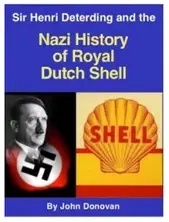 |
So, Michael, when you write in your rebuttal to me that we should let readers decide if Standard Oil acted patriotically or not, I agree, let them decide. You just just have to make sure that you represent the situation honestly, as I do.
And yes, America could have won the war using ethanol fuel instead of gasoline for one very simple reason: All of the equipment running on gasoline could have been powered by ethanol. Ethanol fuel is superior to gasoline. Moreover, bio-diesel made from ethanol or other materials is just as good as petroleum-based diesel fuel. Contrary to Lord Curzon's comment, the Allies 'rode' to victory on the land, sea, and air machines that were manufactured by industrious American workers, and all of these machines could have used ethanol.
All other anti-ethanol issues that you raised in your original Forbes article remain wrong. And the conclusion you offer in your rebuttal to me is incorrect. Here are the facts:
-
1. Automobiles don't run just fine on E10, they run just fine on E15, E20, E25, E30, and higher...and they always have.
2. Gasoline does not NOW, suddenly, require an octane enhancer; an octane enhancer was ALWAYS required for higher compression engines. This is why and how leaded gasoline came into existence. The only reason that ethanol was not used as the octane enhancer (or as the primary fuel) is because the people, who you are in the pocket of, controlled the market via political bribes, lies, and media sponsorships.
3. What was very foolish, and very deadly, were the "political mandates" that kept ethanol from being able to compete with gasoline, and become the dominant internal combustion engine fuel.
4. Equally foolish are the spokespeople who sacrifice their integrity and jeopardize their careers to spread lies and misinformation on behalf of the petroleum oil industry.
I look forward to any new reply you might like to make, and I promise not to shirk from answering it in a timely manner.
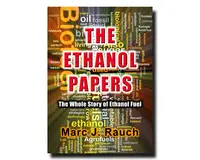 |
If you like to know more about ethanol fuel, LOTS MORE, read my 641-page book "THE ETHANOL PAPERS." It's available online for FREE by CLICKING HERE.



